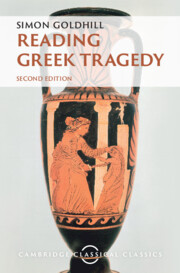Book contents
- Reading Greek Tragedy
- Cambridge Classical Classics
- Reading Greek Tragedy
- Copyright page
- Dedication
- Epigraph
- Contents
- Preface
- Preface to Second Printing
- Re-Reading Reading Greek Tragedy
- Chapter 1 The Drama of Logos
- Chapter 2 The Language of Appropriation
- Chapter 3 The City of Words
- Chapter 4 Relations and Relationships
- Chapter 5 Sexuality and Difference
- Chapter 6 Text and Tradition
- Chapter 7 Mind and Madness
- Chapter 8 Blindness and Insight
- Chapter 9 Sophistry, Philosophy, Rhetoric
- Chapter 10 Genre and Transgression
- Chapter 11 Performance and Performability
- Bibliography
- Index
Chapter 1 - The Drama of Logos
Published online by Cambridge University Press: 19 October 2023
- Reading Greek Tragedy
- Cambridge Classical Classics
- Reading Greek Tragedy
- Copyright page
- Dedication
- Epigraph
- Contents
- Preface
- Preface to Second Printing
- Re-Reading Reading Greek Tragedy
- Chapter 1 The Drama of Logos
- Chapter 2 The Language of Appropriation
- Chapter 3 The City of Words
- Chapter 4 Relations and Relationships
- Chapter 5 Sexuality and Difference
- Chapter 6 Text and Tradition
- Chapter 7 Mind and Madness
- Chapter 8 Blindness and Insight
- Chapter 9 Sophistry, Philosophy, Rhetoric
- Chapter 10 Genre and Transgression
- Chapter 11 Performance and Performability
- Bibliography
- Index
Summary
Like so many modern philosophers, literary critics and novelists – heirs to ancient questions – fifth-century b.c. writers show an ‘intense interest in the limits and possibilities of language’.1 This interest connects numerous writers across numerous genres and disciplines. In the texts of philosophy, the concern with language not only gives rise to the development of linguistic study itself, but also is reflected in the prime place of logos, dialectic, rhetoric – the role of language itself – in the development of philosophical systems from Heraclitus to Aristotle. Modern occidental philosophy, for all its historical turns, is still working through Aristotelian linguistic categories and distinctions. It is the fifth century too that offers the first formal studies in rhetoric, the teaching and practice of which dominated education for two thousand years and more, and has recently been the focus of much of the most iconoclastic modern philosophical and literary criticism.2
- Type
- Chapter
- Information
- Reading Greek Tragedy , pp. 34 - 67Publisher: Cambridge University PressPrint publication year: 2023

